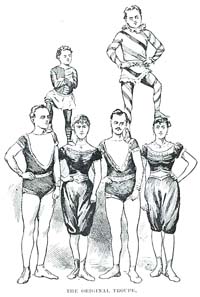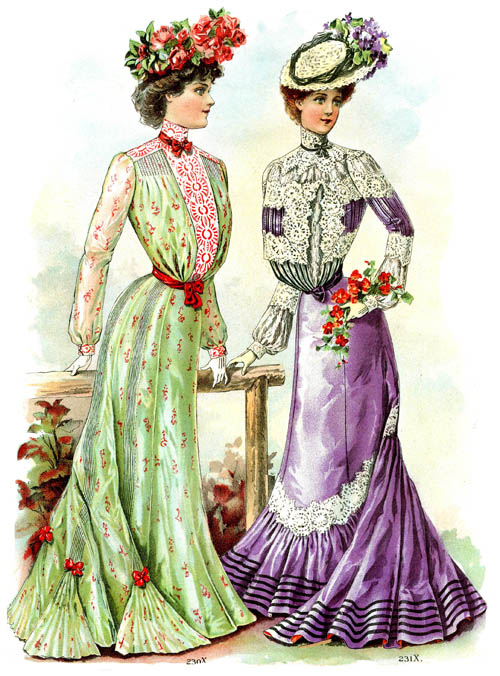|
Home > Victorian Life > Unusual Performances

|
To many, the Victorian era seems the very model of constrained, rigid, staid behavior. Yet it was also an era of amazing eccentricity! During the 1880's and 1890's, Victorians were in a constant search for new sensations (rather like today!). Hence, this period saw the emergence of a host of bizarre, eccentric, and sensational performances, from entertainers who played cards underwater to a gentleman who could play the piano with his nose. New technologies were a constant inspiration to such performers, who explored what could be done with this new-fangled electricity and more. Here's a look at some rather "off the wall" Victorian "acts."
|
- John Spooner's Great Human Menagerie, by Joel Stacy
(St. Nicholas, 1875)
- This is basically an explanation of how to create a "menagerie" of children using some rather clever costumes.
- Whistling as a Profession: An Interview with Mr. Charles Capper, by Lucian Sorrel
(Cassell's Family Magazine, 1895)
- The Great Wizard of the West: Mr. J.N. Maskelyne at the Egyptian Hall, by T. Hanson Lewis
(English Illustrated Magazine, 1895A)
- An Animal Actor, by Harry How
(The Strand, 1895B)
- An "Interviewette" with Charles Lauri, who made a career of playing various types of animals and was particularly known for his role as an orangutan.
- Some Peculiar Entertainments, by Framley Steelcroft
(The Strand, 1896A)
- A variety of "sideshow" acts.
- Paper-Folding, by L.S. Lewis
(The Strand, 1896B)
- Mr. David Devant, master of the performance art of "lightning paper-folding" to create a variety of shapes.
- "Professor Hoffman" and Conjuring, by George Knight
(Windsor Magazine, 1896B)
- "Professor Hoffman" is actually Angelo Lewis, author of the book Modern Magic.
- Sideshows, by William G. FitzGerald
(The Strand, 1897A & B)
- The Greatest Juggler in the World, by William G. FitzGerald
(The Strand, 1897A)
- Hand Shadows, by Bernard Miller
(The Strand, 1897B)
- Hand-shadow performances of David Devant and M. Trewey.
- A Human Alphabet, by William G. FitzGerald
(The Strand, 1897B)
- Just what it says - an alphabet composed of living human figures.
- A New Entertainer of Society: A Talk with Miss Beatrice Herford, by Archibald Cromwell
(Windsor Magazine, 1897B)
- The humorous monologues or recitals of performer who would be described today as an "impressionist."
- The Greatest of Acrobats: The "Marvellous Craggs," by Robert Machray
(Windsor, 1898A)
- A Champion Orange-Peeler, by A.B. Henn (The Strand, 1899B)
- An ocean-going chef's unusual hobby.
- Walking the Pole, by A.H. Broadwell
(The Strand, 1899B)
- A new carnival entertainment.
- A Curious Electrical Display, by Harold Shepstone
(The Strand, 1900A)
- An American performer who uses wired Indian clubs to create an electric light display.
- General Tom Thumb, by Mary Shears
(St. Nicholas, 1900A)
- A famous dwarf born in Bridgport, CT, around 1832, who became a sensation in Mr. Barnum's circus.
- The Most Extraordinary Dinner on Earth, by Albert Broadwell
(The Strand, 1900A)
- The dinner-juggling performance of The Rambler Troupe.
- A Musical Curiosity; or, an Automaton Orchestra, by M. Dinorben Griffith
(The Strand, 1900A)
- Mysterious Box Tricks, by James Scott
(The Strand, 1900A)
- The "Soap-Bubblers'" First Reception, by Meredith Nugent
(St. Nicholas, 1900A)
- An amazing soap bubble performance, with giant bubbles, bubbles containing people, bubbles within bubbles and more.
- The Human Ostrich
(Strand, 1901A)
- Henry Harrison, who has baffled medical science by being able to consume pins, nails, knives, glass, etc. He discovered this ability as a child and apparently continues to enjoy munching on metal.
- The Jones-Hilliard Bicycle Sensation, by Tertius Carr
(Strand, 1901B)
- A spectacular demonstration of hands-free cycling by Charles Jones.
- A Lightning Modeler, by Frank Holmfield
(Strand, 1901B)
- No, Mr. De Bessell doesn't model lightning; he creates models and faces in clay at lightning speed - on stage.
- The Most Sensational Motor Ride, by Winston Spencer
(Strand, 1901B)
- Charles Kilpatrick's performance in New York of driving an automobile down a steep chute at top speed.
- A Parlour Séance with David Devant, by E.T. Sachs
(Strand, 1901B)
- No ghosts involved; a famous conjurer demonstrates some of his tricks.
- [Fred Connor] The Skipping [Rope] Champion of the World, by Fred A. Talbot
(Strand, 1901B)
- Ball-Hopping Extraordinary, by Frank Holmfield
(Windsor Magazine, 1902A)
- A remarkable performance at the Alhambra in London.
- Piano-Playing Extraordinary, by Frank Holmfield (Windsor Magazine, 1903)
- The truly extraodinary piano-playing methods of George Ross Gilfallan, who plays classical pieces with his nose, his feet, upside down and more.
-
- The Dog Orchestra, by John West(The Strand, 1897B)
- A look at six dogs who, yes, actually play musical instruments!
- An Educated Monkey (The Strand, 1897B)
- An orangutan who became a San Francisco sensation!
- Diving Elks, by Emory James
(The Strand, 1898B)
- A Burlesque Bull-Fight, by Arthur Broadwell
(The Strand, 1899B)
- Queen Victoria required personal assurance that this Southend performance was, in fact, all innocent fun...
- Diving Horses, by Arthur Broadwell
(The Strand, 1900A)
- Football Dogs, by Albert Broadwell
(The Strand, 1900A)
- Dogs trained to play soccer.
- A Novelty on the Race-Course, by M.F. Toler
(Strand, 1901A)
- A pair of race-horses driven by a pair of spaniels.
- Boxing Horses, by H.J. Holmes
(Windsor Magazine, 1903A)
- Yes, horses that have been trained to box!
- • See also Animals On Show, On Stage and At Work
|
Visit Our Victorian Shop
for:
Books
Coloring Books
Beautiful Spiral Journals
Holiday Greeting Cards
|
|


 Discover thousands of Victorian images in our
Discover thousands of Victorian images in our 